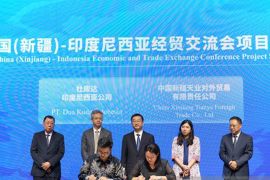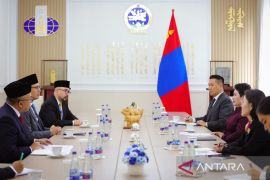"We are facing global warming, which is posing a serious threat," Satya Widya Yudha, deputy chairman of Commission VII of the House of Representatives (DPR), noted.Jakarta (ANTARA News) - Indonesia should continue to develop its new and renewable energy (ETB), which is expected to be instrumental in reducing the major role of conventional fossil fuels in future.
Moreover, the air quality in major cities in the country has been declining due to pollution as a result of gas emissions arising from various modes of transportation, among others.
"We are facing global warming, which is posing a serious threat," Satya Widya Yudha, deputy chairman of Commission VII of the House of Representatives (DPR), noted in Jakarta on Monday (Apr 24).
Hence, the government, through the National Agency for Assessment and Application of Technology (BPPT), has intensified its studies and research work for the development of ETB in the country.
Among other efforts made by the BPPT is cooperating with overseas institutions in conducting research work and developing ETB. It is cooperating with the Alternative Energies and Atomic Energy Commission (CEA) of France.
"Now, we are developing solar panels and lithium batteries. We hope to also be able to work together to develop batteries for submarines and aircraft," BPPT Chief Unggul Priyanto stated during a meeting with two French research and development institutions in Jakarta late last month.
The BPPT has also expressed interest in cooperating with the CEA for conducting research and development of hydrogen-based EBT technology for fuel cell electrolysis. To establish this cooperation, the BPPT will send a team to follow up on the details of which fields in EBT technology would the collaboration be carried out.
The cooperation with the French research and development institution provides a viable opportunity for BPPT to increase the competence of its human resources. Moreover, scholars or doctorate graduates account for nine percent of BPPTs human resources.
"They are more advanced in conducting research work in the fields of information and telecommunications technology as well as for forms of ETB, such as solar panels, batteries, micro-electronics, and nuclear and their manufacturing," Priyanto noted.
Head of CEA Daniel Verwaerde stated that CEA has, since the past decade, developed photovoltaic and is currently conducting research on more advanced materials that could be used by countries not receiving ample sunlight.
"What we are pursuing is to boost energy efficiency," Verwaerde noted.
The CEA also continues to develop sodium-ion batteries that last longer as compared to lithium batteries. No leakage has, so far, been detected. Moreover, ample materials are available for the production of these batteries, so their prices could be lowered.
The development of sodium-ion or natrium-ion batteries in France has currently reached the industrialization stage. Researchers there are still developing safer packages.
The researchers are developing a smart grid that constitutes a smart electricity network capable of preventing about 60 to 70 percent of the potential losses.
BPPT Deputy for Material and Energy Information Technology Hammam Riza noted that Indonesia can also cooperate in conducting research in the digital economic sector, including in the field of cybersecurity systems.
In the development of a smart grid, Indonesia, through the state-owned power company PLN, has also established cooperation with French companies.
Head of the Corporate Communication Unit of PLN I Made Suprateka remarked that PLN is set to boost the development of renewable energy in the country, including through cooperation with foreign investors.
PLN has signed several memoranda of understanding (MoUs) with Think Smartgrids, PT Akuo Energy Indonesia, and Pace Energy Pte Ltd in the presence of French State Minister of Digital Industry and Innovation Christope Sirugue on Mar 29.
Think Smartgrids is an association of French experts in the field of smart grids.
The MoUs are related to cooperation for the transfer of knowledge in planning and implementing a smart grid to integrate renewable energy with the existing systems; conducting a feasibility study and analysis of the system of using solar and wind energy; and on feasibility study on the use of solar and wind energy.
The signing of the MoUs reflects PLNs commitment to achieving the target of contributing 23 percent of the renewable energy to the national energy mix in 2025.
Indonesias energy development vision in future lays emphasis on the use of new and renewable energy.
In 2015, the national energy mix had comprised 39 percent oil, 22 percent gas, 29 percent coal, and 10 percent new and renewable energy.
Indonesia is planning to achieve an energy mix of 25 percent oil, 22 percent gas, 30 percent coal, and 23 percent new and renewable energy in 2025.
In 2050, the energy mix will comprise 20 percent oil, 24 percent gas, 25 percent coal, and 31 percent new and renewable energy.
The DPR will continue to support the governments vision with regard to its energy mix, so that by 2050, the country will increase the use of EBT by 31 percent.(*)
Reporter: Andi Abdussalam
Editor: Heru Purwanto
Copyright © ANTARA 2017











